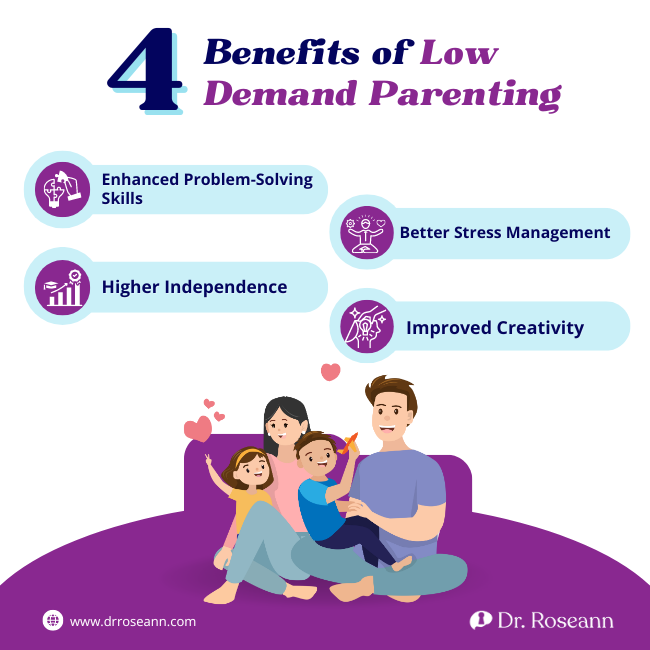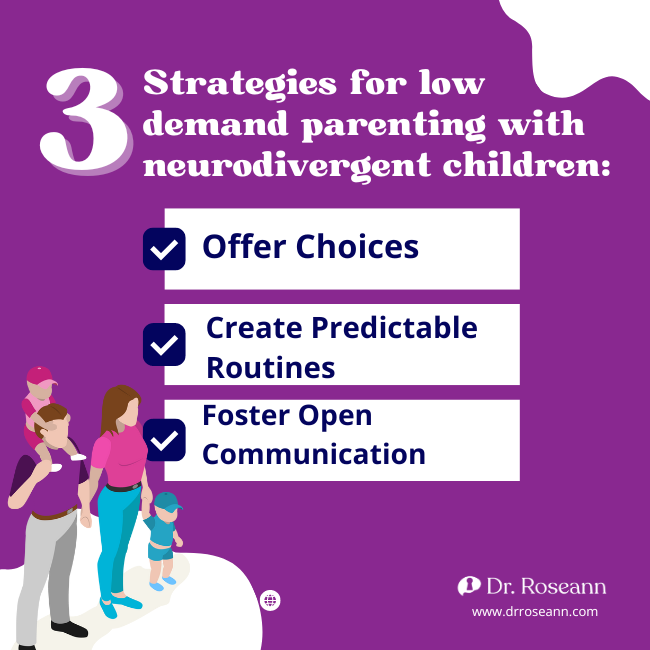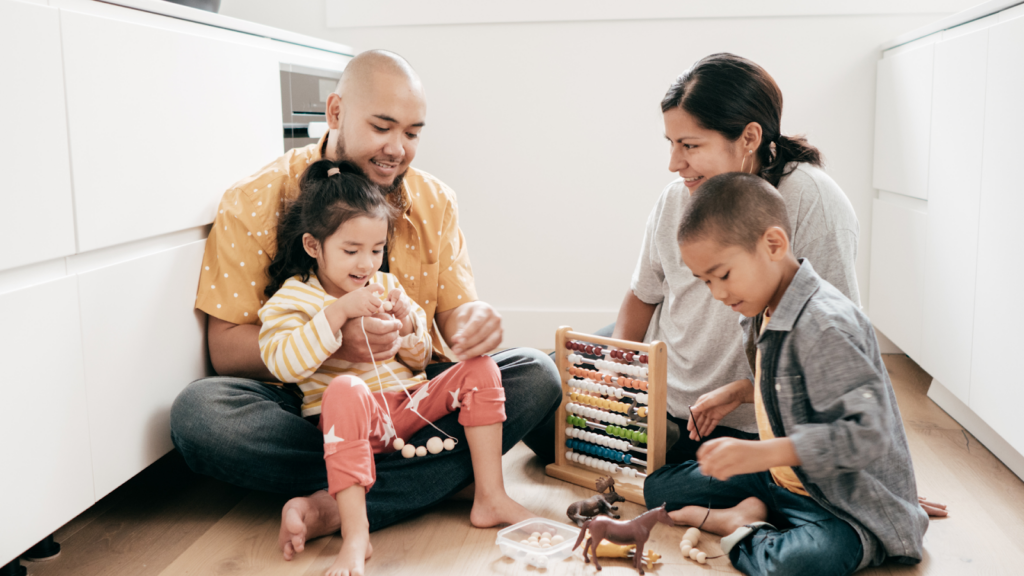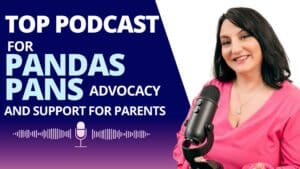Low demand parenting might sound counterintuitive to some. After all, isn't parenting all about setting boundaries, enforcing rules, and guiding our children?
Yes, but it's also about fostering independence, self-reliance, and resilience in our children. Enter low-demand parenting – a concept that might revolutionize how you approach raising your kids.
What is Low Demand Parenting?
Low demand parenting is a philosophy that focuses on creating an environment where children are encouraged to explore, learn, and grow at their own pace. It's about stepping back from the traditional authoritarian parenting style and allowing children more autonomy in decision-making.
Low demand parenting is about being less directive and more supportive. I advocate for this approach because parents can empower their children to become independent thinkers and problem solvers by adopting this mindset.
Imagine a panda in its natural habitat – serene, calm, and undisturbed. That's the essence of the panda approach to parenting. Like the panda, low demand parents create a nurturing environment that allows their children to flourish without the constant pressure of demands and expectations.
Low demand parenting is much like the gentle approach of pandas. Pandas provide their cubs with enough space and freedom to explore their interests and develop their skills without feeling overwhelmed by parental demands.

Low Demand Parenting Examples
Finding the delicate balance between guidance and autonomy is paramount. Low demand parenting is the equilibrium that offers a nurturing approach to foster independence and self-reliance in children.
Many of the families I work with in my Ridgefield, CT center lean toward low demand parenting after struggling with their children who have behavioral issues. They realize that constant conflict isn’t going to move the dial and that this approach can be very effective especially for kids with PDA, ASD, ODD, PANS/PANDAS or other clinical issues.
Let's take a closer look at some examples of low demand parenting in action:
Encouraging Self-Directed Play
Instead of structuring every moment of your child's day with planned activities, allow them the freedom to engage in unstructured play. This fosters creativity, problem-solving skills, and independence.
One study examined how playing outside in nature might make kids more confident. They had 21 kids aged 8 to 12 play outside during a summer camp. They tested how confident the kids felt before and after playing outside.
They found that while the test scores didn't change much, the kids seemed more confident based on what they saw happening during the outdoor play sessions. Playing outside might not make you feel more optimistic on a test, but it could still help you feel better about yourself (Starling, 2011).

Supporting Decision Making
Rather than making all the decisions for your child, involve them in the decision-making process. Offer choices and encourage them to weigh the pros and cons to help them develop critical thinking skills.
One study examines how people make decisions and how parenting affects this process, especially in children and teenagers. It talks about different styles of decision-making, some good and some not so-good. The study found that many kids use not-so-good decision-making styles, which can lead to problems.
It also shows how parents raise their kids and how this can influence their decisions. Parents play a significant role in how their kids learn to make decisions, which is vital for their development (Davids et al., 2015).
Promoting Self-Care
Teach your children how to take care of themselves by allowing them to participate in age-appropriate tasks such as dressing up, preparing simple meals, and managing their belongings.
Promoting self-care in children through age-appropriate tasks equips them with practical skills. It nurtures their independence, self-confidence, and sense of responsibility, laying a solid foundation for their future well-being and success.
Low Demand Parenting and Neurodivergent Children
For parents of neurodivergent children and teens, such as those with Pathological Demand Avoidance (PDA), the principles of low demand parenting can be particularly beneficial. PDA is a profile on the autism spectrum characterized by an extreme aversion to everyday demands and requests.
I can’t stress enough the importance of understanding the unique needs of neurodivergent children and adjusting parenting strategies accordingly. For instance, using declarative language – a form of communication that offers choices and suggestions rather than commands – can help reduce anxiety and resistance in children with PDA.

Strategies for low demand parenting with neurodivergent children:
1. Offer Choices
Instead of issuing commands, present options and allow your child to choose based on their preferences and comfort level. Parents of kids with neurodivergent profiles, such as PDA, understand the challenges of traditional parenting approaches.
For these children, demands can trigger heightened anxiety and resistance, making the typical command-response dynamic ineffective and potentially harmful. In such cases, embracing a low demand parenting style becomes beneficial and essential for creating a supportive and understanding environment where children can thrive.
2. Create Predictable Routines
Establishing predictable routines can provide a sense of security and stability for neurodivergent children, reducing anxiety and meltdowns. An autistic adult who has experienced the challenges of navigating a world that often feels overwhelming understands the significance of routine in maintaining a sense of stability and well-being.
Predictable routines serve as anchors in a sea of uncertainty, offering a comforting framework that helps manage anxiety and prevent meltdowns. In low demand parenting, establishing and maintaining these routines becomes a cornerstone of support, enabling neurodivergent children to navigate daily life with greater confidence and resilience.
3. Foster Open Communication
Maintain open lines of communication with your child, listening to their concerns and respecting their boundaries. Build trust and genuine connections to foster a safe and supportive environment where your child feels valued and understood.
Actively listening to your child's concerns and respecting their boundaries cultivate a sense of trust and mutual respect that nurtures positive relationships. Prioritize open communication to empower neurodivergent children to confidently express themselves authentically and navigate the complexities of social interaction.
The Benefits of Low Demand Parenting
Embracing a low demand parenting approach allows you to cultivate a nurturing environment where your children feel empowered to explore their interests, make mistakes, and learn from them. This not only promotes independence and resilience but also strengthens the parent-child bond.
Low demand parenting offers a refreshing perspective on raising independent children. By adopting the panda approach and embracing the principles of autonomy and support, parents can empower their children to thrive in an ever-changing world. Remember that this approach is not about doing less as a parent but rather doing things differently. The results can be truly transformative.
If you need help unlocking your child’s behavior, attention, and learning with science-backed solutions, download any of our Parent Kits. Unlike traditional approaches to mental health, these game-changing toolkits are tailored to your child’s specific needs and filled with easy-to-use information and strategies.
How does expert define low demand parenting?
When parenting with low demand meaning, you prioritize creating an environment that minimizes pressure and expectations on your children; you foster independence and self-reliance by focusing on nurturing rather than controlling. Experts define this approach as stepping back from authoritarian styles and offering support and guidance while allowing children the autonomy to explore and learn at their own pace.
What's a low demand lifestyle in parenting?
A low demand lifestyle in parenting emphasizes creating a nurturing environment where children are encouraged to explore, learn, and grow at their own pace, with minimal pressure or expectations. It involves stepping back from authoritarian parenting styles and allowing children more autonomy in decision-making. This approach prioritizes support and guidance over strict rules and directives, fostering independence and self-reliance in children.
What does PDA child mean?
A PDA (Pathological Demand Avoidance) child is a neurodivergent individual, often on the autism spectrum, characterized by an extreme aversion to everyday demands and requests. They may exhibit resistance, avoidance, and anxiety in response to perceived needs.
Can you have PDA without autism?
While PDA (Pathological Demand Avoidance) is often associated with autism spectrum disorder (ASD), some individuals may display PDA traits without meeting the criteria for an ASD diagnosis. It's essential to recognize that PDA can exist independently of autism, although it shares similarities in terms of demand avoidance behaviors.
How to parent a child with PDA?
Parenting a child with PDA (Pathological Demand Avoidance) involves understanding their unique needs and challenges. Adopting a flexible and empathetic approach is essential, as well as using strategies such as offering choices instead of commands, maintaining predictable routines, and fostering open communication. Building a trusting and supportive relationship while seeking professional guidance from therapists or specialists experienced in PDA can also be beneficial.
Citations
Davids, E. L., Roman, N. V., & Leach, L. (2015). Decision Making Styles: A Systematic Review of Their Associations with Parenting. Adolescent Research Review, 1(1), 69–90. https://doi.org/10.1007/s40894-015-0003-y
Starling, P. (2011). An Investigation of Unstructured Play in Nature and its Effect on Children’s Self-Efficacy. Doctorate in Social Work (DSW) Dissertations. https://core.ac.uk/download/pdf/76365714.pdf
Dr. Roseann is a mental health expert in Neurodivergent Parenting who is frequently in the media:
- The Creative Clinician's Corner (Article) Helping Parents Get Unstuck
- The Washington Post Parenting through pandemic decision fatigue
- The Week Best Parenting Advice
Always remember… “Calm Brain, Happy Family™”
Disclaimer: This article is not intended to give health advice and it is recommended to consult with a physician before beginning any new wellness regime. *The effectiveness of diagnosis and treatment vary by patient and condition. Dr. Roseann Capanna-Hodge, LLC does not guarantee certain results.
Are you looking for SOLUTIONS for your struggling child or teen?
Dr. Roseann and her team are all about science-backed solutions, so you are in the right place!
Grab your complimentary copy of
147 Therapist-Endorsed Self-Regulation Strategies for Children: A Practical Guide for Parents
Dr. Roseann is a Children’s Mental Health Expert and Licensed Therapist who has been featured in/on hundreds of media outlets including The Mel Robbins Show, CBS, NBC, PIX11 NYC, Today, FORBES, CNN, The New York Times, The Washington Post, Business Insider, Women’s Day, Healthline, CNET, Parade Magazine and PARENTS. FORBES called her, “A thought leader in children’s mental health.”

She coined the terms, “Re-entry panic syndrome” and “eco-anxiety” and is a frequent contributor to media on mental health.
Dr. Roseann Capanna-Hodge has three decades of experience in working with children, teens and their families with attention-deficit hyperactivity disorder (ADHD), autism, concussion, dyslexia and learning disability, anxiety, Obsessive Compulsive Disorder (OCD), depression and mood disorder, Lyme Disease, and PANS/PANDAS using science-backed natural mental health solutions such as supplements, magnesium, nutrition, QEEG Brain maps, neurofeedback, PEMF, psychotherapy and other non-medication approaches.
She is the author of three bestselling books, It’s Gonna Be OK!: Proven Ways to Improve Your Child's Mental Health, The Teletherapy Toolkit, and Brain Under Attack. Dr. Roseann is known for offering a message of hope through science-endorsed methods that promote a calm brain.
Her trademarked BrainBehaviorResetⓇ Program and It’s Gonna be OK!Ⓡ Podcast has been a cornerstone for thousands of parents facing mental health, behavioral or neurodevelopmental challenges.
She is the founder and director of The Global Institute of Children’s Mental Health, Neurotastic™Brain Formulas and Dr. Roseann Capanna-Hodge, LLC. Dr. Roseann is a Board Certified Neurofeedback (BCN) Practitioner, a Board Member of the Northeast Region Biofeedback Society (NRBS), Certified Integrative Mental Health Professional (CIMHP) and an Amen Clinic Certified Brain Health Coach. She is also a member of The International Lyme Disease and Associated Disease Society (ILADS), The American Psychological Association (APA), Anxiety and Depression Association of America (ADAA) National Association of School Psychologists (NASP), International OCD Foundation (IOCDF).
© Roseann-Capanna-Hodge, LLC 2024










